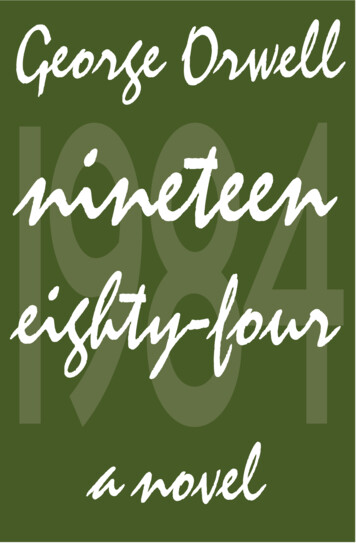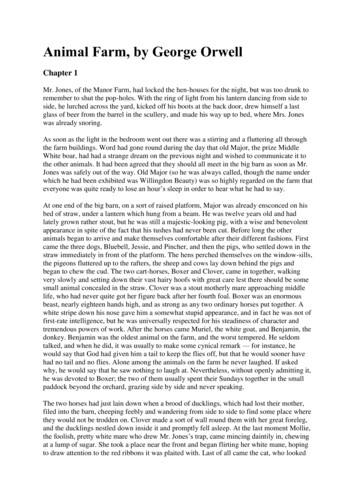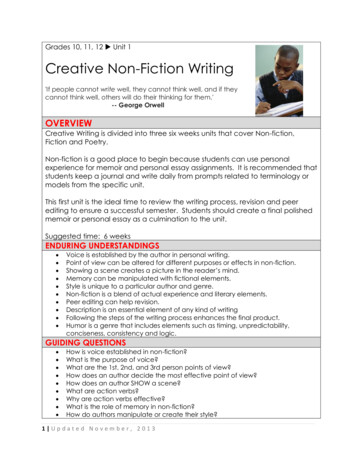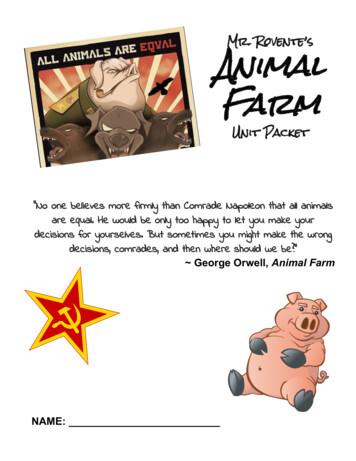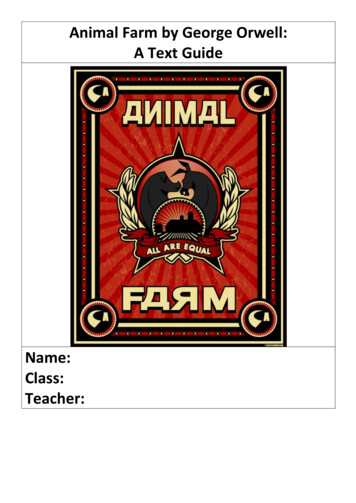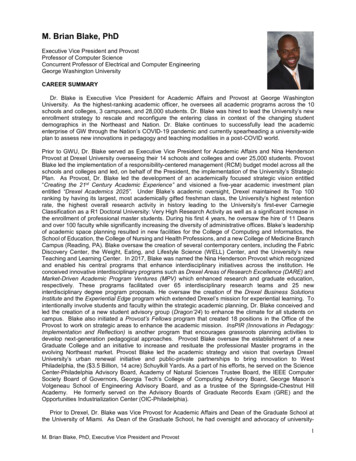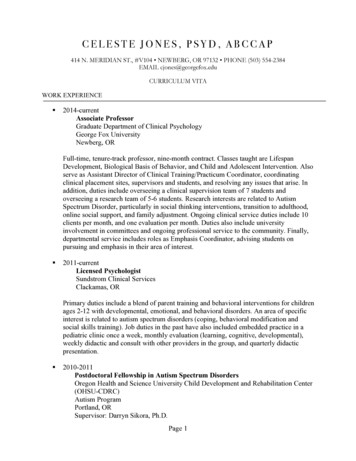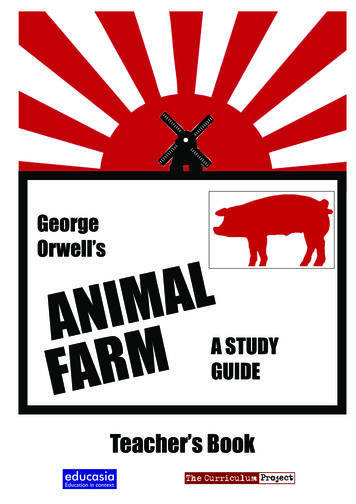
Transcription
GeorgeOrwell’sLAMIANMRFAA STUDYGUIDETeacher’s Book
TeachersBefore you begin this module with your students:Animal Farm relates very closely to the Russian Revolution. While reading this novel with the students,there will be many instances where the book relates to Russia. In order to be informed, you should readabout the Revolution before beginning the novel.Students should have a blank journal at the start of this module. This journal will be the place wherestudents write down their answers to the questions for each chapter, as well as the many differentresponses and activities that are included in the module.Many questions are open-ended; they are opinion questions and there are no right or wrong answers.We have made suggestions in the teacher’s book, to help you give the students ideas.Using the study guideThe module is designed to be as easy to teach as possible, but in order to use it successfully you shouldthink about a few things before you start:LanguageIf your students do not have at least a good upper intermediate level of English, we recommend you donot use this study guide. Even upper-intermediate students may struggle. You should have dictionariesto hand, and frequently check that they are understanding the main points.You may like to explain things in the students’ first language when you can’t get the meaning across inEnglish.Ideas If you don’t have enough time to complete each activity, leave out some sections, and skip activitiesthat will take a long time or won’t be very useful for your students. If an activity won’t work well in your class, change it to something that will. If a section is too easy for your students, skip it, or supplement it with more challenging materialfrom elsewhere.We hope you find this module challenging, interesting and fun. Please send us feedback so we canimprove it for the next edition.Educasia produces low-cost, context-appropriate educationalmaterials for Myanmar adults. Subjects include Englishlanguage, social sciences and teaching skills. All resourcescan be downloaded free of charge from the website. We alsoprovide teacher training and curriculum advice to communityeducation programmes. Please get in touch if you have anycomments or queries.Animal Farm: A study guide - Teacher’s Booki
1Animal Farm: A study guide - Teacher’s Book
Animal Farm: A study guide - Teacher’s Book2
Introduction1. Give the students a few minutes to look at the cover pictures quietly. The students should be lookingat the expression of the pigs and see how angry the pigs look.A. Both covers are quite similar. What do they show?Possible answers: Angry pigs. Pigs behaving like humans.B. What do you think will happen in the story based on the two covers of this book?Possible answers: The pigs are taking control of the farm The pigs are controlling the animals The animals seem to be afraid of the pigs. The pigs might be in charge of them.Extra: Ask the students to get into small groups and discuss what might happen in the story as a group.Ask one group member to discuss in front of the class what his/her group thought would happen. Writethe ideas on the board and keep them as you read the book.Identifying AnimalsRead the passage to the students. Read the whole passage at one time and do not stop on the words withthe lines. The students will have to use listening skills to understand which words are missing.At one end of the big barn, on a sort of raised platform, Major was alreadyensconced on his bed of straw, under a lantern which hung from a beam. He wastwelve years old and had lately grown rather stout, but he was still a magestic looking pig, with a wise and benevolent appearance in spite of the fact that his tusheshad never been cut. Before long the other animals began to arrive and makethemselves comfortable after their different fashions. First came the three dogs,Bluebell, Jessie, and Pincher , and then the pigs, who settled down in the strawimmediately in front of the platform. The hens perched themselves on the windowsills, the pigeons fluttered up to the rafters, the sheep and cows lay down behind thepigs and began to chew the cud. The two cart-horses, Boxer and Clover, came in together,walking very slowly and setting down their vast, hairy hoofs with great care lest thereshould be some small animal concealed in the straw. Clover was a stout motherly mareapproaching middle life, who had never quite got her figure back after her fourth foal.Boxer was an enormous beast, nearly eighteen hands high, and as strong as anytwo ordinary horses put together. A white stripe down his nose gave him asomewhat stupid appearance, and in fact he was not of first-rate intelligence, but he wasuniversally respected for his steadiness of character and tremendous powers ofwork. After the horses came Muriel , the white goat , and Benjamin, thedonkey.3Animal Farm: A study guide - Teacher’s Book
Before You Read:Respond: An Equal SocietyStudents choose one of the writing prompts and respond. Stronger students can choose more than one ifthey want.What is a Revolution?Before reading Animal Farm, discuss with the students the idea of a revolution. Make sure that the studentsunderstand the main ideas of a revolution and how they can occur. You should write down the main ideasand vocabulary on the board or a large piece of paper and keep it in the class.1. Students brainstorm two to three different revolutions that have occurred at least ten years ago.Students can choose any revolutions from around the world. Encourage students to look at books,websites and discuss in groups if they need help. Students answer the three different questions.There can be many different answers.Possible Answers: 1989- East German Revolution: Led to the Berlin Wall being destroyed. 1989- The Tiananmen Square protests: A series of non-violent demonstrations led by students,intellectuals and labour activists in the People’s Republic of China between 15 April and 4 June1989, ended in a massacre carried out by the People’s Liberation Army. 1986- The People Power Revolution: Peacefully overthrows Ferdinand Marcos after his twodecade rule in the Philippines.2. Students now respond individually in their notebooks and answer the two questions. There aremany possible answers; they are opinion questions.Extra: Ask the students to share their answers with the class. Write down the students’ differentanswers in the front of the class and then compare at the end. Discuss with the students which answersmight be the best, and why.Animal Farm: A study guide - Teacher’s Book4
The Russian RevolutionStudents read the paragraph about the Russian Revolution. There are many key points in this paragraphthat the students should understand before reading the book.When the students are finished reading, ask them key questions to see if they understand:Possible questions: Why did the Russian Revolution occur? Can you find any similarities between the Russian Revolution and other revolutions? Who was Karl Marx? Who was Lenin? Who were the Socialists? Were they right to follow Marx?5Animal Farm: A study guide - Teacher’s Book
Identifying AnimalsStudents match the pictures with the animal names.When the students finish the exercise, give the answers as a group. Ask different students from the class togive the answers.1. Boar2. Raven3. Mare and foal4. Calf5. Hen6. Sow7. Dog8. Pigeon9. Sheep10. Cow11. Horse12. Rat13. Donkey14. Goat15. Piglet16. CatkdcomeihlgpbnfjaExtra: Discuss with the students what the roles of these different animals might be on a farm (workinganimal, animal bred for food, pest, etc).Also ask students to predict what the roles of the animals may be in the story of Animal Farm.Animal Farm: A study guide - Teacher’s Book6
Tracking charactersThe students should keep this page with them when they are reading the book and continue to fill in thesquares with the different characters that they read about in the book. This will help them remember thedifferent characters’ names.Students should complete this table during the class when reading the book. After every chapter, ask thestudents if any new important characters have been introduced. As a whole class, you should discuss thecharacter and the character’s characteristics/actions/purpose. This will help the students understand allthe characters.Possible examples: Chapter ICharacterOld MajorBenjaminBoxerMr. oseGets the revolution started, advocates for realchange.Never talked, quite angry, did not do much work.Large horse, not very smart, but very powerful.White stripe on his nose.The farmer, always drunk. Did not do very muchwork. Animals do not like him,In charge of the animals. Angry pig. Very mean andunfair. Rules over all animals.Another pig. Spreads what Napoleon says aroundthe farm to other animals. Always trying to helpNapoleon.Animal Farm: A study guide - Teacher’s Book
Chapter IPre-readingPredictionsStudents read the paragraph from Chapter I and make predictions about old Major’s dream, what it willbe about, what he will say, and what it may mean for the animals of Manor Farm.ComprehensionStudents choose the right answer as they read the chapter.1.2.3.4.5.6.7.B. On a farm.C. The animals respect Major.B. Miserable.B. Human beings.A. The farmer will kill all the animals.So that they could have a secret meeting.A fox. He thought the animals were making noise because a fox was in the hen house. He fired hisgun to scare away the fox.8. Many different answers. Possible responses include: milk, eggs, wheat, corn, fruits, vegetables.9. Some time in the future. It is not definite.10. Animals must unite against man. They must “struggle” for freedom. He is not more specific.Animal Farm: A study guide - Teacher’s Book8
DiscussionStudents answer these questions as a class.1.A. Encouraging. Powerful. Meaningful, etc.B. The animals taking over the farm. Animals becoming the rulers of the land.C. It is a very powerful song that depicts strength. The animals feel represented.2.D. They are universal. Songs are easy to remember and easy to sing together.E. Students may have many different answers. No animal is ever to live in a house. (Caring more about possessions) No animal is ever to sleep in a bed. (Becoming lazy-spending too much time in bed sleepinginstead of working) No animal is ever to wear clothes. (Pride in appearance) No animal is ever to drink alcohol. (Drinking to excess-forgetting duties) No animal is ever to smoke tobacco. (Ruining health, expensive habit) No animal is ever to touch money. (Money corrupts) No animal is ever to engage in trade. (Profit making) No animal is ever to tyrannize his own kind. (Slavery) No animal must ever kill another animal. (Murder) All animals are equal. (Competition is self-serving) Whatever walks on two legs is evil. Do not resemble humans. All animals are brothers.3. Many animals may be greedy but most animals will follow the rules and respect the ideals.Who?Students match the quotes and descriptions with animals from the story.A. BenjaminB. MajorC. BoxerD. MajorChapter IIPredictions1. Ask the students to think about what might happen in Chapter II. Have a class discussion and havestudents share their ideas with others. Encourage students to think of many different possibilities.Possible Questions: Will the uprising be successful? Will all the animals partake in this uprising? Can all of the animals be trusted?2. Students discuss Question 2 with a partner. Give the students at least 20 minutes to work on thistable. The students should come up with at least four positive and four negative answers. 9Help the students come up with ideas if they cannot think of any.Animal Farm: A study guide - Teacher’s Book
Possible Answers:PositivesNegativesAll animals will be equal.Some animals may try to take control.The animals will become healthier andhappier.Animals do not know how to run a farm.The animals will be able to rest when they like. Who will take control of the farm and the duties?The animals can enjoy the product of theirlabour.Will some animals become too lazy and begin toruin the farm?The animals do not have to worry about beingkilled by farmers.Mr. Jones may decide to return and take controlof the farm because animals have no guns.ComprehensionStudents choose the best answer as they read the chapter.1. B. They looked at life in a very different way.2. A. The pigs.3. C. They were hungry.4. B. Feed the animals.5. C. Kicked them off of the farm.6. C. Things that remind them of Mr. Jones’ power.7. A. Ribbons symbolize slavery.8. A. Move his tail.9. B. Moses the raven.10. C. The luxury.11. B. They can read and write.Animal Farm: A study guide - Teacher’s Book10
12. C. Squealer is good at speaking.13. A. Turn it into a museum.14. Their system is very theoretical (lots of ideas). Most of the animals are concerned only with verypractical matters.15. If Mr. Jones were gone, how would the animals eat? If the Rebellion is going to happen no matterwhat, why do the animals need to work for it? Why should the animals care about what happensafter they die? Will there be sugar and ribbons after the Rebellion?16. That they had rebelled yesterday and were now free. They were happy and excited.DiscussionStudents answer these questions as a class.1.Possible answers:Sugarcandy Mountain sounds like an animal paradise where all animals go when they die. If allanimals will go to such a paradise when they die, there is nothing to worry about and no need towork for the Rebellion.2. It was more the immediate feeling of the animals that caused them to act rather than the philosophyof the pigs.3. He uses many descriptive words like “ecstasy” and “excitement.” He wants us to think that the farmwas a horrible place, made better without the humans. Orwell wants us to see how great and happyeveryone is now that the animals are in charge.4. Reading, writing, teaching, distributing food (milk and a double ration of corn), calling the animalsto harvest.5. Countries with name changes: Myanmar changed its name from the old colonial “Burma” in 1988.East Pakistan became Bangladesh in 1971. Thailand was called Siam before 1949.Cities with name changes: India changed many of its city names, from the colonial English to theIndian: Bombay to Mumbai, Calcutta to Kolkata. Another example is Saigon, in Vietnam. After theVietnam War the USA left Vietnam and the Communists united North and South Vietnam. Saigonwas changed to Ho Chi Minh City, after the Vietnamese Communist leader of the same name.Renaming a country (or cities within a country) may have an effect on the sense of identity of acountry, may make people feel more connected to the country, or perhaps feel more nationalistic.It may also help people feel like more of a part of a country if the name is changed to reflect allethnicities and groups within the country.Who?Students match the quotes and descriptions with animals from the story.A. SnowballB. MosesC. Squealer11Animal Farm: A study guide - Teacher’s Book
The Seven CommandmentsAsk the students to think of 5-10 rules that they would have if they were in charge of something andwanted to make things fair for everyone. Get the students to sit in a group or with a partner and think ofthese rules. Give students 20 minutes to discuss and write. After, each group should share their rules withthe class.There are many possible answers to the three questions.Extra: bring a large sheet of paper to class and have all the students write down their rules on thissheet. The students can color the sheet and post it somewhere where other classes and students cansee the laws. You can also ask the students to translate the rules into their own language and call themthe “class laws”.Keep the sheet of paper up for the entire module and see if the students would like to change any of thelaws as they continue to read the book. The students should do this activity independently.Animal Farm: A study guide - Teacher’s Book12
Chapter IIIPre-ReadingStudents do the vocabulary exercise independently for ten minutes. Encourage students to look indictionaries. If needed, students can fill these words out as they read the chapter.1.2.3.4.5.6.7.implement - a. a tool or instrument used in doing workwelfare - g. an individual’s health and well-beingresolution - d. a possible solution to a problem, voted on by an organisationmotto - c. a brief statement expressing the guiding principles of a person or organisationmaxim - e. an expression, usually a general truth or principledole out - b. to give out sparingly or in small quantitiesseclusion - f. to be hidden, in secret, not easily seenPredictionsStudents think about what will happen in Chapter III, based on the events that happened in Chapter II.Encourage the students to: 1) Write these down in a journal; 2) Discuss in small groups; or 3) Share theirideas with the class.Extra: If there is time, the students may create a prediction sheet that can be posted in the front of theclass. At the beginning of every chapter, the students can post their predictions on the board. At the endof the novel, the students and teacher can go back to the board and see how many of the predictionsfrom the chapters were correct and how many were wrong.ComprehensionStudents choose the best answers as they read the chapter.1.2.3.4.5.6.13B. They were made for human hands.C. He wanted to do more work.C. Reading and writing classes.A. The animals produced it for themselves.C. On the new flag.A. Sheep.Animal Farm: A study guide - Teacher’s Book
7. B. Napoleon.8. A. The pigs took them to eat.9. A. If the pigs aren’t healthy, Mr. Jones will come back.10. He is hard working and physically strong.11. The pigs spoke the most. Snowball and Napoleon were very active.12. Napoleon and Snowball.13. Orwell does not say exactly, but he implies that the cat wanted to eat the birds.14. Because most of the animals could not learn the Seven Commandments by heart.15. Napoleon took them from their mothers to the loft for “education.”DiscussionStudents answer these questions as a class.Possible answers:1. Pigs eat the apples and drink the milk. The pigs oversee the work on the farm, they do not do anyphysical labour. The pigs control the Sunday meetings in the barn.2. Snowball and Napoleon start fighting with each other.3. Many possible answers are possible. Students’ opinions.Who?Students match the quotes and descriptions with animals from the story.A. SquealerB. BoxerC. The pigsD. The wild animalsA Successful Society1.Students work in small groups for this exercise. Ask students to think about the important jobsthat citizens have that make a country/region run effectively and positively. Before starting, writeexamples on the board (e.g. honest police officers, well-trained teachers, etc)All students write these ideas in their notebooks, even if they are working in a group. After finishing,they share their answers with the class.Possible discussion questions: How many answers are the same? Are any jobs better than others? Who will build the roads and buildings?2. Students work in pairs. Encourage the students to speak English. Give the students 30 minutes tofinish this table. Encourage students to read through the chapter again to find examples for eachbox.Animal Farm: A study guide - Teacher’s Book14
Possible answers:Functions ofHow does myGovernmentcommunity try toaccomplish thisfunction?Examples in Animal FarmWhy does this functiondevelop at this particularpoint in the story?EconomicsSmall businesses arestarted to help createjobs.The pigs try to get the animalsto work hard to make produce.The farm needs to besuccessful and animals needfood.LeadershipTeachers dedicatetime to teachstudents.The pigs try to rule the farmand take control.The pigs want to controleverything.Teaching values, howto treat one another,etc.Old Major’s dream, the conceptof “Animalism.”Need to convince animalsof the need to rebel againstJones. Need to unify themembers of the Animal Farminto one community.EducationBuild schools, payteachers, diplomas,GED exams.Teaching animals to read,teaching animals the SevenCommandments.The pigs want the animals toread the rules.LawPolice, military, etc.Pigs create the laws/rules.Pigs want all control rightaway.SecurityPolice, military, safehouses, etc.Pigs create “security” (onlypretend).Pigs want animals to feel safeso they respect pigs.IdeologyOtherChapter IVPre-ReadingStudents do the vocabulary exercise independently for ten minutes. Encourage students to look indictionaries. If needed, students can fill these words out as they read the chapter.1. anniversary - g. a celebration that happens at regular intervals to remember an important event2. charge - c. to run directly at someone in order to make an attack3. military decoration - f. a medal given as an award, usually pinned on a uniform, in honor of special4.5.6.7.8.9.bravery or successcowshed - h. a shelter for cowsretreat - a. to run awayinvasion - d. an entrance, especially of an armed force, as if to take overexploit - e. an adventure or exciting storyrebelliousness - i. the attitude of wanting to make a revolution, or generalambush - b. a surprise attackPredictionsWrite the vocabulary words from above on the board and ask the students what they think will happen inthis chapter based on the words.15Animal Farm: A study guide - Teacher’s Book
Possible answers:Rebellion, animals will hold a celebration, animals will retreat and will lose, etc.ComprehensionStudents choose the best answers as they read the chapter.1.2.3.4.5.6.B. Ran into Jones with his heavy weight.A. Other animals’ rebelliousness.B. Mix with.D. Propaganda.B. Difficult to stop.They pretended it was stupid because they were afraid. They flogged and whipped the animals to tryand keep control of them.7. They feared a rebellion by the animals on their own farms.8. Skirmishing to disorient the human beings, then luring them into the barn where they could ambushthe invaders.9. He read a book about military tactics and a book by Roman general and emperor Julius Caesar.10. They sing “Beasts of England,” tell stories about their adventures in battle, and give medals to Boxer,Snowball, and the sheep that died.11. He is clever, intelligent, a good strategist, brave, cruel, dedicated, fearless, etc.True or False questions:12. False13. False14. True15. FalseDiscussionStudents answer these questions as a class.Possible answers:1. Independence Day and Aung San’s birthday. They may be important to teach people about history,to keep society unified, to increase support for the government, etc.2. Snowball leading them into battle and knowing what to do; All the animals that participated in thefight; The sheep that died; Boxer for his might.3. Boxer is a calm, harmless animal who does not wish to take any human’s life. Snowball is a viciousanimal who wishes to kill humans and create fear through death.Animal Farm: A study guide - Teacher’s Book16
Who?Students match the quotes and descriptions with animals from the story.A. Frederick and PilkingtonB. Mr. JonesChapter I-IV Review/ReflectionStudents take some time to reflect and respond to the last four chapters. All the questions on this pagecan be written down in the students’ journals This page can be done during class time, or can be done forhomework.RespondEncourage students to relate their answers to their own lives and find personal meaning in the novel.Students should find important connections between Chapters I-IV and the world around them.Recall and InterpretPossible answers:1. The rebellion takes place in many ways. It was not planned. Mr. Jones was very drunk and forgot tofeed the animals. The animals rebelled. Mr. Jones comes back and tries to drive them away.2. The pigs are just taking the milk because they feel entitled to it and the animals blindly let it happen.This suggests that the pigs are at the top of the power hierarchy because they are the clever ones.3. Orwell uses foreshadowing in old Major’s speech in Chapter I to cast doubt on the Revolution. Inhis speech, old Major alludes to Animalism being a goal for many years but never actually beingattained.4. Snowball is a passionate speaker, but he doesn’t have the same following as Napoleon. His reactionto the stable boy’s death is very harsh and unsympathetic. Students may have different ideas onwhether casualties in a revolution are necessary.Literature and WritingBattle LogA battle log is a short description of what has happened in a battle. Students should write down the namesof all the animals included in the Battle of the Cowshed and write a description of how the battle changedthe character. (e.g. Snowball- He became more active as a leader and more in control after all the farmersleft).Role PlayStudents divide into teams of three to four. Each student from the team should choose one chapter and findat least two quotes that they think are funny. After the students share these quotes with their group, ask thestudents to come up and read the quotes to the class. He/she should use actions and voices.17Animal Farm: A study guide - Teacher’s Book
Chapter VPre-readingStudents match the words with their definitions.1. faction - e. a small group with beliefs of interests that are different than the larger group2. urinate - d. to pee3. scheme - c. a plan4. closet - b. to hide oneself in seclusion, often to perform a task in solitude5. assume - g. to accept as true without thinking6. tactic - k. a method or action used to achieve a short-term goal7. ration - f. specific amount of food given out8. protest - i. to express strong disapproval or disagreement9. windmill - a. a large machine that uses wind to generate power10. eloquence - h. the ability to speak persuasively or expressively11. oppose - j. to be against somethingPredictionsStudents discuss this question in small groups. Encourage students to speak English. After five minutes,discuss this questions as a class. Write some of the answers on the board and see if any of the students’predictions are correct as they read the chapter.What Do They Really Mean?Explain to the students that Orwell uses language to mean different things in the story. Students shouldrealize that when reading the book, they should see that many of the animals mean two different thingswhen they speak. This happens in real life as well as a way to trick innocent people.As they read, students discuss the quotes in groups and write the true meaning of each.When they are finished, ask them to reread Chapters V-VII again and find other quotes with possible doublemeanings, and their true meanings. Animal Farm: A study guide - Teacher’s Book18
Possible answers:The WordsIn the future, all questions relating to the workingof the farm would be settled by a special committeeof pigs presided over by himself.“No one believes more firmly than ComradeNapoleon that all animals are equal. He would beonly too happy to let you make your decisions foryourselves. But sometimes you might make thewrong decisions, comrades, and then where shouldwe be?”»»»»What They Really MeanNapoleon is going to make all the decisions.The pigs will remain in control. The otheranimals should not be trusted.»»»»»»ComprehensionStudents choose the best answers as they read the chapter.1. B. She betrayed Animal Farm and went to work for humans.2. C. The weather made it difficult to live.3. B. They would all meet together in the barn.4. B. Electricity would make life easier.5. B. Food production is more important.6. A. Defense of the farm.7. B. Being no better than a criminal.8. B. The dogs’ growling.9. A. Sunday meetings.10. They would have supported Snowball’s plans for the windmill because they were promised lesswork and many comforts and luxuries.11. If the other animals made decisions, sometimes they might make a mistake.19Animal Farm: A study guide - Teacher’s Book
12. Neither. Benjamin does not usually agree with the pigs.13. He urinated on them.14. False15. True16. True17. TrueDiscussionStudents answer these questions as a class.Possible answers:1. There is very little substance to the chant. The unthinking sheep adopt it and their incessantchanting drowns out opposition.It is ‘brainwashing’. A way of making people believe what you say by repeating a simple, easy tounderstand message.2. Because the animals were afraid of the pigs and the power that they had. They were also afraid ofthe dogs. Squealer was very persuasive when he spoke.3. They can be useful through the power of the voice. They can create fear or confidence.4. The animals are always assuming things, meaning they rely on the pigs for all the answers.Assuming things is dangerous because it means you could be drawing the wrong conclusions whichcan get you in trouble.5. All animals will benefit from Snowball’s plans, because less work will need to be done. The pigsmight destroy the plans out of greed and control.Animal Farm: A study guide - Teacher’s Book20
The Great Windmill DebateStudents read the paragraph together and then discuss the questions together as a class.Possible Answers:1. The pigs. They decided to take control of all decisions, but votes would still be done by all animals.2. “It had come to be accepted that the pigs, who were manifestly cleverer than the other animals,should decide all questions of farm policy.”3. Napoleon and Snowball.4. Napoleon and Snowball could not agree on anything.5. The running of the farm.Extra: Ask the students how they would decide who would run the farm if they were the pigs. Whatways of deciding would they use? Which way is most fair? How do you know if a farm is run properly?What happens if certain animals do not do their job?For this section of the activity, the students will hold a debate. D
Animal Farm: A study guide - Teacher’s Book 4 Before You Read: Respond: An Equal Society Students choose one of the writing prompts and respond. Stronger students can choose more than one if they want. What is a Revolution? Before reading Animal Farm, discuss with the stude
